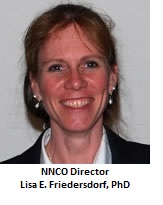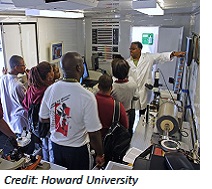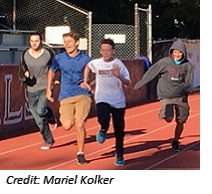NNCO Quarterly Newsletter: Winter 2021 Edition
|
|
| WHAT’S BIG IN SMALL SCIENCE? A Quarterly Newsletter of the National Nanotechnology Coordination Office (NNCO) |
|
DIRECTOR’S CORNER
The NextTech Student Network continues to share the individual club seminars across the network, enabling each event to engage students across the country. The students are also considering some competitions and preparing for the Student Leaders Conference in the fall (more information below). As the final days of winter wind down and the early spring flowers begin to emerge, I am filled, as always, with optimism. The nanotechnology research community is strong and working together to advance many areas of nanoscience; just a few highlights are below. Mechanisms to better engage and collaborate are being developed and implemented and will be part of the new NNI. And there is light at the end of this terrible pandemic tunnel we’ve lived in for the past year. The light, in part, is due to past investments in nanotechnology and the foundational understanding of lipid nanoparticles that accelerated the development of some of the vaccines that are now getting into arms. (My sleeve is rolled up and ready for my turn!) As convenient as virtual meetings can be, and the commute cannot be beat, I do look forward to traveling and hope to see you soon. In the meantime, don’t hesitate to reach out with your questions or to share your highlights. |
|
NEWS FROM NNI AGENCIES On Feb. 16, 2021, biotechnology company Moderna announced that 45.4 million doses of its lipid-nanoparticle-delivered COVID-19 vaccine had been supplied to the U.S. Government to date. As of Feb. 16, approximately 25.5 million doses of the vaccine had been administered in the United States, according to CDC. The AstraZeneca vaccine uses nanotechnology to deliver DNA instructions to build a coronavirus spike protein. The vaccine was developed with funding from BARDA and is 82.4% effective at preventing COVID-19. This vaccine has been approved for use in the European Union, the United Kingdom, and Canada. AstraZeneca is conducting phase 3 clinical trials in the United States. On Feb. 27, 2021, Janssen, a division of Johnson & Johnson, received FDA emergency use authorization for its COVID-19 vaccine. The vaccine uses nanotechnology to deliver DNA instructions to build a spike protein, spark an immune response, and create antibodies. The vaccine, which was developed with funding from On Jan. 21, 2021, biotechnology company Novavax announced that its protein-based COVID-19 vaccine candidate was 89.3% effective at preventing COVID-19. The study assessed efficacy during a period with high transmission and with a new variant strain of the virus emerging and circulating in the United Kingdom. The vaccine, which was developed with funding from BARDA and DOD, contains nanoparticles that deliver a full-length, prefusion spike protein to cells inside the body. The following examples highlight nanotechnology research advances that were recently announced: Detecting multiple sepsis biomarkers from whole blood – made fast, accurate, and cheap (funded by DOD); Nanowire could provide a stable, easy-to-make superconducting transistor (funded by NSF); Research breakthrough could transform clean energy technology (funded by NSF and DOE); Stanford research could lead to injectable gels that release medicines over time (funded by NSF); Cell-selective nanotherapy prevents post-angioplasty restenosis, promotes artery healing (funded by NIH); Nanoparticle drug delivery technique shows promise for treating pancreatic cancer (funded by NIH, NSF, and VA); ‘Smart bandage’ detects, could prevent infections (funded by NSF and NIH); Kombucha tea sparks creative materials research solution (funded by DOD); Researchers develop new graphene nanochannel water filters (funded by NIH); Flashing plastic ash completes recycling (funded by DOE, DOD, and NSF); NIST publishes a beginner’s guide to DNA origami (funded by NIST); The complex mystery of membranes: Researchers find controlling the nanoscale structure of membranes is key for clean water (funded by NSF); Nanocylinder vibrations help quantify polymer curing for 3-D printing (funded by NIST); Stretchable micro-supercapacitors to self-power wearable devices (funded by NIH and NSF); Ultrathin spray-applied MXene antennas are ready for 5G (funded by NIH and NSF); Flame on! How AI may tame a complex materials technique and transform manufacturing (funded by DOE). |
|
NANOTECHNOLOGY COMMERCIALIZATION Commercialization of nanotechnology-enabled products continues to advance, with several recent announcements from companies across the country. One of the companies, located in New York City, is developing subcutaneous graphene electrode implants on the scalp that provide continuous seizure monitoring and uninterrupted data collection. An Atlanta company has developed a nanotechnology-based thermal-management material designed to fill air gaps between computer chips to dissipate heat, replacing epoxy or graphite-based materials. A company based in Ann Arbor, MI, is developing nano-LED technology that provides light in the invisible UV spectrum for “far-UVC” disinfection applications and in the visible RGB spectrum for the next generation of LED display technology (signage, mobile, augmented/virtual reality, and HDTV). Another company, located in Cincinnati, OH, has been awarded a contract by the Naval Air Warfare Center Weapons Division (China Lake, CA) to enhance the performance of traditional graphite epoxy composite tactical missile solid rocket motor cases. The purpose of the project is to improve the ability to meet high structural loading, aerothermal, and lightning strike protection requirements for surface-launched tactical missile systems. |
|
NANOTECHNOLOGY ENVIRONMENTAL, HEALTH, AND SAFETY (nanoEHS) IMPLICATIONS The second webinar in the 2021 NNI nanoEHS webinar series will be held on March 23, 2021, beginning at 12:00 pm EDT. Paul Westerhoff (Arizona State University), Barbara Harthorn (University of California Santa Barbara), Tom Peters (University of Iowa), and Aaron Erdely (NIOSH) will describe key findings in quantifying and assessing the effects of human exposure to nanomaterials. You can register for this webinar here. |
|
STEM EDUCATION
The NextTech student network is also interested in promoting opportunities for students to participate in competitions. BIG solutions from small technology – an NTEC-MUNI initiative supported by Virginia Tech’s NSF-funded NanoEarth – was held earlier this month. The NextTech students are collaborating with nanoHUB to promote a weekend-long undergrad challenge. The nanoHUB Challenge is still under development but expect an announcement this spring. Stay tuned! The NextTech students are gearing up for the 2021 Nano and Emerging Technologies Student Leaders Conference. The application portal will be open soon. The conference will be co-located with the 2021 TechConnect World Innovation Conference in Washington, DC, October 18–20, 2021. K–12 teachers, there is a vast array of classroom-ready nanotechnology resources, including nanoHUB and resources for educators from NNCI. For more information about resources, please contact nanoed@nnco.nano.gov. If you are interested in free brochures for your classroom, please contact us. |
|
NANOTECHNOLOGY AND YOU Through three different podcast series, guests explore nanotechnology topics from different perspectives: Stories from the NNI episodes are conversations with experts from the NNI community who share their perspective on advances that have been made and future prospects for nanotechnology. Recent episodes feature Jeff Welser (IBM Research), Matt Hull (Virginia Tech), Rama Podila (Clemson University), Kurt Kolasinski (West Chester University), Chuck Black (Brookhaven National Laboratory), and Kristi Kiick (University of Delaware). Nano Matters episodes explore specific nanotechnology topics for a broad audience. Recent episodes feature Rama Podila (Clemson University), Kristi Kiick (University of Delaware), Ankit Agarwal (Imbed Biosciences), Linh Le (Flextrapower), and Rhonda Franklin (University of Minnesota). Nano Entrepreneurship Network episodes highlight best practices, resources, and advice from nanotechnology entrepreneurs and those who support them. Recent episodes feature Ross Dunlap (Ceres Nanosciences Inc.) and Steve Wilcenski (BNNano). |
|
Friedersdorf participated in the OECD Bio- Nano- & Converging Technologies (BNCT) meeting in December 2020, and a paper resulting from the advanced materials steering group activities over the past two years was declassified and published: “Collaborative platforms for innovation in advanced materials.” Friedersdorf and Kellon attended a European Union (EU) NanoFabNet workshop on January 20–21, 2021. NanoFabNet EU is a new project that aims to serve as an international hub for sustainable industrial-scale nanofabrication. The focus of the workshop was to better understand the needs of the nanotechnology development community to inform the suite of services NanoFabNet will provide. Kellon and NNCO contract staff member Maria Fernanda Campa attended the COVID TechConnect – Innovation Spotlight Summit on February 17, 2021. The conference featured 60 2-minute video pitches from domestic and international innovators in academia and industry. Summit attendees included representatives from the health care, business, government, and defense sectors. Participants pitched in three application areas: (1) diagnostic technologies for SARS-CoV-2, (2) detection technologies for SARS-CoV-2, and (3) technologies for oxygen delivery and therapy. Nanotechnology and nanotechnology-enabled devices played a significant role in the innovations presented. Campa and Kellon also attended a virtual workshop organized on March 9, 2021, by the Research Triangle Nanotechnology Network that addressed the question: “How can open-access university facilities best support food and nutrition security?” Friedersdorf provided opening remarks at the New York State Workforce Development Workshop, held during the week of March 15, 2021, with thanks to the organizers from Rochester Institute of Technology, Cornell University, and Binghamton University. Friedersdorf and NNCO contract staff member Geoff Holdridge have been participating in a variety of agency and industry workshops on semiconductor and microelectronics research and education during the winter of 2020/21. |
|
UPCOMING EVENTS April 7–9, 2021 April 21–23, 2021 April 27, 2021 |
|
www.nano.gov | info@nnco.nano.gov Click here to subscribe to our newsletter. |



 The highlight of the winter for us was certainly the National Nanotechnology Initiative (NNI) stakeholder workshop in January. Although the event was held virtually, we were really pleased by the level of engagement and thoughtful input received from the presenters and participants. I want to express my sincere thanks to everyone who took the time to consider the issues we posed in the request for information and provided feedback through formal submissions, participation in the workshop, or informal messages and conversations. We value your thoughts, and the next NNI strategic plan will be better for it! But we at NNCO are not going to wait until the new plan is released later this year to take advantage of your good ideas. Please keep an eye on Nano.gov for announcements regarding new activities to support the community, including focused efforts for the Nanotechnology Entrepreneurship Network (NEN). Please reach out if you are interested in joining the conversation.
The highlight of the winter for us was certainly the National Nanotechnology Initiative (NNI) stakeholder workshop in January. Although the event was held virtually, we were really pleased by the level of engagement and thoughtful input received from the presenters and participants. I want to express my sincere thanks to everyone who took the time to consider the issues we posed in the request for information and provided feedback through formal submissions, participation in the workshop, or informal messages and conversations. We value your thoughts, and the next NNI strategic plan will be better for it! But we at NNCO are not going to wait until the new plan is released later this year to take advantage of your good ideas. Please keep an eye on Nano.gov for announcements regarding new activities to support the community, including focused efforts for the Nanotechnology Entrepreneurship Network (NEN). Please reach out if you are interested in joining the conversation. On Feb. 12, 2021, pharmaceutical company Pfizer and its German partner BioNTech
On Feb. 12, 2021, pharmaceutical company Pfizer and its German partner BioNTech  Two new episodes from the
Two new episodes from the  The 2021 NNI nanoEHS webinar series will focus on sharing what we now know about the environmental, health, and safety aspects of engineered nanomaterials, and will highlight the NNI’s role in answering key questions. The inaugural webinar, “What We Know About NanoEHS: How It All Began,” kicked off on Feb. 9, 2021, and brought together several of the pioneering scientists who were pivotal in the emerging field of nanoEHS: Vicki Colvin (Brown University), Andrew Maynard (Arizona State University), Günter Oberdörster (University of Rochester), Dave Rejeski (Environmental Law Institute), and John Howard (NIOSH). The speakers shared their perspectives on the research environment in 2011, the major questions posed, and how the collaborations and networks that emerged have created a research infrastructure to address these questions. An archive of this webinar is available
The 2021 NNI nanoEHS webinar series will focus on sharing what we now know about the environmental, health, and safety aspects of engineered nanomaterials, and will highlight the NNI’s role in answering key questions. The inaugural webinar, “What We Know About NanoEHS: How It All Began,” kicked off on Feb. 9, 2021, and brought together several of the pioneering scientists who were pivotal in the emerging field of nanoEHS: Vicki Colvin (Brown University), Andrew Maynard (Arizona State University), Günter Oberdörster (University of Rochester), Dave Rejeski (Environmental Law Institute), and John Howard (NIOSH). The speakers shared their perspectives on the research environment in 2011, the major questions posed, and how the collaborations and networks that emerged have created a research infrastructure to address these questions. An archive of this webinar is available  The
The  Planning and organizing the virtual
Planning and organizing the virtual  NNCO Director Lisa Friedersdorf, NNCO Deputy Director Stacey Standridge, and AAAS Science and Technology Policy Fellow Jaclyn Kellon attended the 13th Nanotechnology Association Conference, hosted by the Japan Nanotechnology Business Creation Initiative on December 9, 2020. The conference featured presentations on nanotechnology policy, strategy, and/or outlook from attendees representing the United States, Canada, Germany, Taiwan, Malaysia, and Japan. Participation in this conference enabled a snapshot of key activities related to nanotechnology research, development, outreach, and safety efforts in many countries around the world.
NNCO Director Lisa Friedersdorf, NNCO Deputy Director Stacey Standridge, and AAAS Science and Technology Policy Fellow Jaclyn Kellon attended the 13th Nanotechnology Association Conference, hosted by the Japan Nanotechnology Business Creation Initiative on December 9, 2020. The conference featured presentations on nanotechnology policy, strategy, and/or outlook from attendees representing the United States, Canada, Germany, Taiwan, Malaysia, and Japan. Participation in this conference enabled a snapshot of key activities related to nanotechnology research, development, outreach, and safety efforts in many countries around the world. March 23, 2021
March 23, 2021

